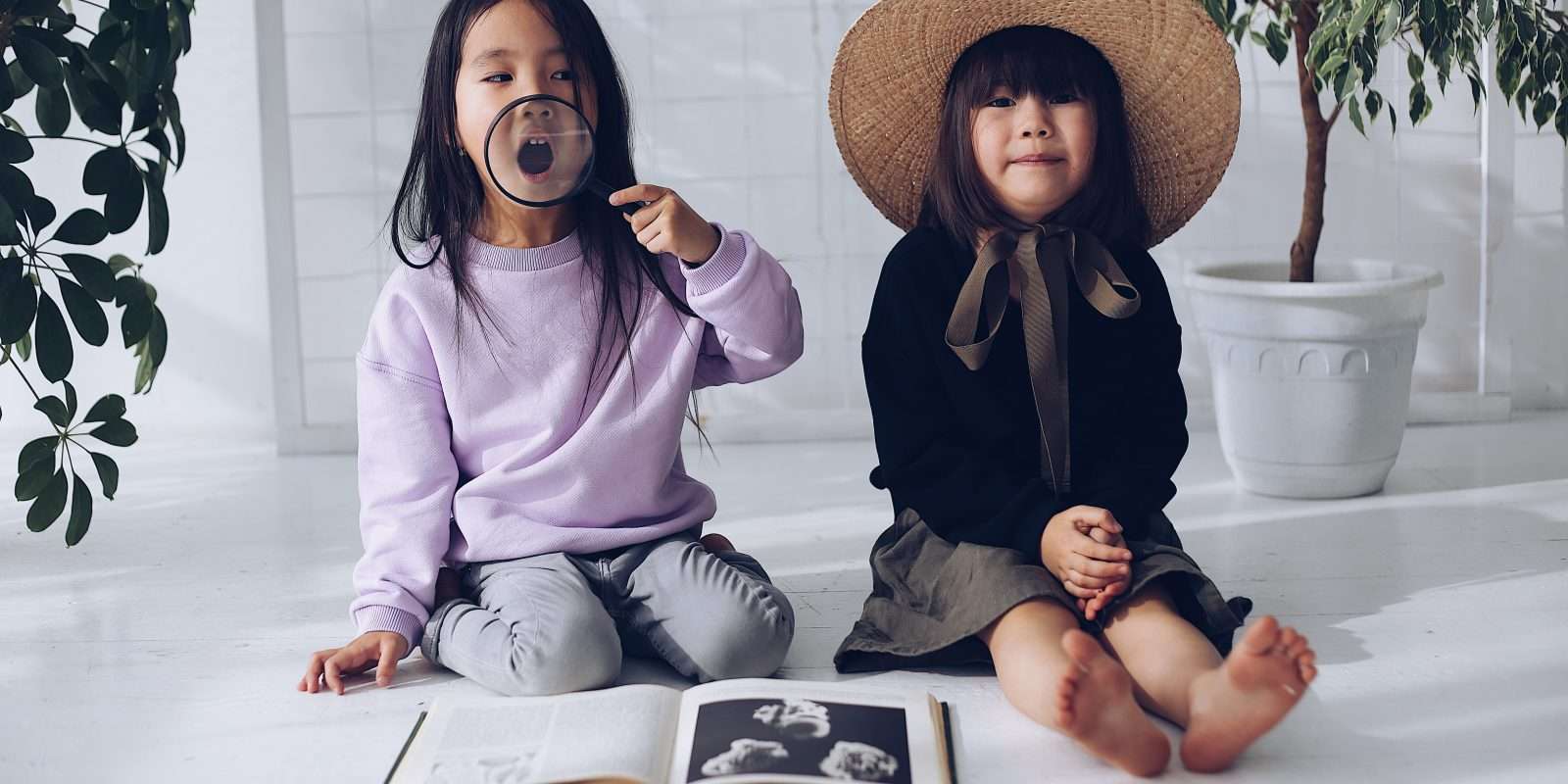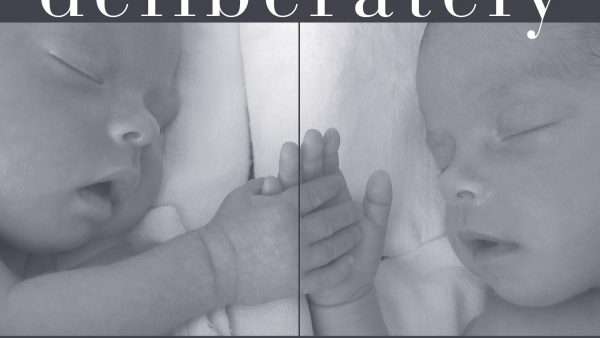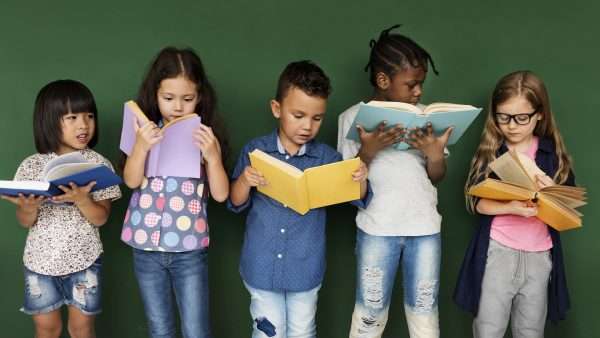While your twins were still in the womb, only six months old, their ears were listening intently. The parts of their brains geared for language were well formed. As a reading teacher and professional storyteller, I knew this fact intellectually, but I was curious about the language development of my twin daughters.
While my wife was still carrying our twins, I began to sing a lullaby to them every night. On the night they were born, after I helped the nurses wash and weigh my twin angels, as soon as the chaos settled, I held both of my twins while my wife slept. I began singing my daughters that same lullaby. They both instantly perked up and looked at me as if to say, “Hey, I know that song! I know that voice!”
It was two days before Christmas and even the mouse was asleep, so I spent half the night singing Christmas Carols to the most appreciative audience I have ever had.
It is never too early to sing, read aloud or tell stories to your twins!
0-2 years
When your twins are newborns, admittedly, they may not sit still for Shakespeare or even all of Good Night Moon. But it is important that you read aloud to them. Lap time is vital. They learn that a book is a warm excuse for cuddling with their parents and giggling.
Brain research affirms what linguists have long known: In these first few years, babies’ brains are still growing. This growth is linked to language acquisition. They learn the sounds and rhythms of speech. Infants may not respond with whole words, but their brains are hard-wired for language. Reading to them, singing to them, and playing rhythmic games with their toes will help them learn language skills.
When my girls were small we did not really read the book; we talked about the pictures, I told a brief version of the story and we made funny animal sounds. I would ask questions about the pictures and we made up stories. It was a time to share.
The emphasis was on fun. They were also learning that books go left to right, these black marks make words, and words carry meaning, and stories have a beginning, middle, and end. They were learning what scholars call reading readiness skills.
It did not matter that we did not always get through the entire book. They were learning that books can bring great joy. At this stage, it is important that they be given plenty of cloth and vinyl books for them to play with and chew. Cardboard books in the toy box imply that books are toys, but are not as good as soft books for babies. My girls also liked textured books with fuzzy pictures and things to touch. When babies are ready they will sit still for an entire story.
2-5 years
Between the ages of 2 and 5, children can learn as many as 2,000 words a year. That is an average of five to six new words each and every day. Aware of this fact, I was always intrigued when a word I read to my twin daughters was used in their conversation within a few hours.
But if you do not read to them on a daily basis this will not happen. Any reading teacher can pick out which kids were read to and which were not. The greatest gift we can give our children is the gift of literacy.
More than simply reading the story in a droll voice, storytellers must feel free to sing, add accents, make sound effects, create the dramatic moment. If it feels like school, reading becomes a chore. Ask open-ended questions during and after reading the book. Share your opinions about the story and ask for their response to the text and pictures. Encourage thoughtful reading.
My two-year-old girls loved to ‘read’ to me. They would crawl into my lap and open a book, turn the pages and make up a story mimicking some of the sound effects and big voices I used. Though they were not technically reading, they were proud of this effort and exhibited all of the skills needed to become good readers.
We also loved wordless picture books. We looked at the pictures and made up a different story every time. They especially liked finger play and story songs. The Itsy-Bitsy Spider and The Alphabet Song were favorites.
Bedtime and nap time stories are a great daily ritual that helps twins relax and get to sleep but don’t stop there. Rowdy stories and acting out the adventure can bring literature to life. Creating silly plays with dress-up clothes and original songs stimulates more reading while laying a foundation for creative writing. Original puppet show productions allow your twins to work together to interpret the text of a classic story.
Beyond the book, at this stage, it is important that children have diverse real-life experiences. (My favorite mantra about computer games: Reality is always better than virtual reality!) If your twins have been to the zoo, flown a kite, ridden a train, climbed a tree, been to the theatre, and tasted cotton candy at the fair, these experiences will in turn inform what they read. New flavors and textures, new experiences strengthen vocabulary and prepare your children for creating their own stories.
As an extreme example, our family went to Costa Rica on vacation when our twins were five. More than vocabulary enhancement, an experience like this gives your twins a rich resource to draw on for the rest of their lives. Now, when we read a story about monkeys, one of my daughters will interrupt and tell her story about a wild spider monkey that crawled down from the tree, across her shoulder, and stole a piece of papaya that she was about to put in her mouth. We also kept a journal, I with poetry and they with pictures. On the plane trip down and back they would draw a series of pictures and I would write down their words. This evolved into a young authors’ project for their kindergarten class when we returned. A holiday trip to grandma’s house is the perfect excuse for this kind of picture writing. These pictures can be copied and sent to grandma as a thank-you card.
6-10 years and beyond
A growing body of research affirms one fact: Kids who love to read are kids who were read to when they were young. But you are never too old to read aloud or be read to. As my daughters’ attention spans grew, we chose longer books. We read more than 50 of The Boxcar Children out loud.
[amazon box=”0807508543″ template=”table”]
As they got older, they took turns reading. Recently we read the sixth Harry Potter novel aloud as a family. Research also says children understand and learn from listening to a story two or three years or grade levels above their reading level. At the same time, improved listening leads directly to improved reading.
If a child has never heard a word, it is not in their sight vocabulary. My wife and I still read poetry and newspaper articles aloud to each other, modeling our love of language.
More important than reading aloud to your twins is that they see you reading. Actions speak louder than words. When you and your spouse practice what you preach, you model that reading is fun and important. And your children get it. Reading is a lifelong habit and the earlier you start, the better.
The Reluctant Reader
When I hear a teacher or parent ask a child: “Do you like to read?” I always correct them. That is not the right question! It should be “What do you like to read?” or better yet, “What do you like to do? Read about that!”
One of my daughters will read a novel a day during the summer. Frequent trips to the library are not frequent enough. Our other daughter is not as eager to spend long days wrapped in the world of fiction.
She loves snakes. She has a small non-fiction library on snake care and the natural history of reptiles. She also loves country music and would rather listen to CDs on her headphones than read. We bought her a subscription to a music magazine. Now she devours it cover to cover within a few days of its arrival. And because we value one-on-one time with our twins, I will occasionally choose a book that interests her and just the two of us will take turns reading it aloud.
Even with identical twins, kids become ready to read at their own pace. Encourage both twins to read. Read to them and with them as a lifelong habit. Read together and individually to your twins.
Give them the time and encouragement to develop at their own pace. If the differences in how well they read or what they like to read are made into an issue, then it becomes a more difficult struggle, especially for parents of twins. As twins grow older, they look for ways to differentiate from their sibling. It would be easy to push them apart and inadvertently create the false idea that one is a reader and the other is not.
With our twins, we know that one loves novels and the other loves non-fiction, though honestly, we encourage them both to read broadly. And knowing that my teenage daughters proofread these articles, (both have published articles of their own!), I will give my wife and myself a pat on the back: These ideas have worked for us. From learning the alphabet song to appearing in school plays, our twins both share our love for literature and language.
About the Author
Brian “Fox” Ellis is a professional storyteller, curriculum consultant and author of the new children’s picture book THE WEB at Dragonfly Pond (DAWN Publications, 2005). He is father to Laurel and Lily, now adolescents. www.foxtalesint.com






